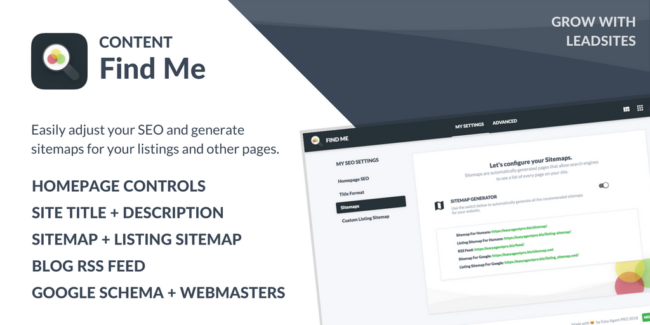January is such a weird month in real estate. With all the time off in late December and early this month, a whole lot of stuff falls through the cracks and suddenly everyone has an emergency.
Whether it’s emergency content needs or “holy cra#, I forgot to schedule the home inspection,” we’re all pretty much paying for that time off we enjoyed.
So, you missed some real estate news. That’s okay, Easy Agent PRO has been keeping up with it for you.
Stand out from the competition with LeadSites: Here’s how it works.
Sh$#! — it’s still cheaper to rent than buy

We love it how the agents we know take real estate news like this in stride. We, on the other hand, do a major freak-out. We want houses to SELL, not rent. Renting is lame.
“Renting a Home More Affordable Than Buying in 59 Percent of U.S. Housing Markets,” real estate news from attomdata.com.
Take a look at the map on the website, though, and you’ll see that buying kicks renting’s butt in the eastern U.S. But, woe-is-me to the Texas, Utah, Nevada, Cali, Washington, Oregon and Idaho agents because it’s cheaper to rent there.
But there’s a big, fat swath of the country that they seem to ignore. What about Alaska, Hawaii, South Dakota, Nebraska and Wyoming, Attom Data? They have real estate there, too.
If you work in Michigan, Ohio, Pennsylvania and New York, figure out how much cheaper it is to buy than rent in your market and yell it all over your blog (and, thus, social media).
The government shutdown and your buyers
To tell you the truth, we’ve been so busy with all of the other real estate news we forgot that the government is shut down. Wish it would’ve happened in April – the 15th to be more exact. All those furloughed IRS workers . . .be still my heart.
At any rate, in a very opinionated article at Housing Wire, Dani Hernandez, professional mortgage underwriter (and, apparently, political commentator), asks the very pertinent question:
“How will the government shutdown affect borrowers seeking a mortgage?”
Since you guys are the ones dealing with this and not us, I would imagine it’s already happening. Just in case your FHA, VA and USDA buyers haven’t been impacted yet, you might want to give them a heads up. Or, maybe not.
Ms. Hernandez breaks it down for us like this:
• USDA loans: On hold indefinitely
• VA Loans: Minimal delays (the VA is funded through the end of 2019 so, in reality there shouldn’t be any delays)
• FHA Loans: Who Knows?
Well, Dani, I know. So, let me share with you what I learned by doing research.
“FHA will be able to endorse single-family loans, with the exception of Home Equity Conversion Mortgages (HECM) and Title I loans, during the shutdown,” according to HUD’s website. Title 1 loans, in case you forgot, are for home improvement and repairs, not for purchases.
Since staff has been furloughed, however, there may be a slowdown in the endorsement process. The decision to close or not, or when, is up to the lender, not FHA.
LeadSites make it easy to stand out online – and rank higher on Google and Bing. Learn more
Reality says that, aside from USDA loans, your clients with government-backed loans will feel little, if any pain from the government shut-down
The HUD website, in fact, says that because they are able to endorse “most single-family loans,” there won’t be any impact on the housing market, “as long as the shutdown is brief.”
You really should read the entire article when you have a minute. We particularly love the sob story Hernandez made up to begin the piece.
It’s about the person who took out a USDA loan and got the clear to close on December 21 and the closing date was the 26th. Poor guy packed up all his stuff and scheduled the moving truck.
“But on the night before Christmas, the phone rang and the voice on the other end informed you your closing had been canceled due to the government shutdown, and everything is on hold until the government reopens,” Hernandez opines.
She goes even deeper into the poor dude’s sitch by making him “homeless, living out of a hotel” with everything he owns packed into “a hundred boxes and you just heard the president say he would keep the government shut down for days, months or maybe even years!”
(Yes, she used an exclamation point on a business website).
Think about it: how many USDA buyers have you worked with? I’m willing to wager that it isn’t many. The USDA only closes slightly more than 141,000 of the millions of mortgages granted every year.
Take a deep breath, Dani. The housing market will be just fine.
Punctuation matters

If you use e-books in your business, this bit of real estate news is for you. A couple of years ago, Richard Adams, founder of merchantaccountforum.com, wanted to boost the response to his Google ads for e-books, without spending a lot of money.
So, he ran three split tests of his ads for one particular e-book with different keywords. All three ads were identical except for the spelling of “e-book.”
• Ebook
• ebook
• eBook
The ads garnered more than 70,000 impressions “over the course of the experiment” (the length of which he fails to disclose).
One version of the word under-performed the other two: “eBook,” with a 0.4 percent CTR. In fact, the lower-cased “e-book” got 125 percent more clicks than “eBook,” according to Adams. He went on to explain that “nothing else changed in the ad, only the capitalization.”
One thing jumps out of this experiment (aside from the fact that it’s not scientific in any way), the author left out an important variant of the word: e-book. It’s the one the style books (Chicago Manual, AP Stylebook, etc.) all demand.
Luckily, we have Google to turn to for this one.
Google Adwords shows that the hyphenated version of the word, “e-book,” is used in search nearly 25 percent more times than “ebook” or “Ebook” combined.
The hyphenated e-book may end up going by the wayside like “e-mail” did, but for now, punctuation matters. If you’re using Adwords in your real estate marketing, every word counts, so do some research before publishing.
And, if you aren’t using e-books in your real estate lead generation, keep checking in because we’ll be convincing you why you should, soon.
And now some real estate news from your association
If you’ve already studied NAR’s 2018 Profile of Buyers and Sellers, skip to the next real estate news topic.
First-time buyers still make up about one-third of the market, although their percentage dropped a percent from last year. As rates rise, we can most likely expect their share of the market to decrease even more.
Speaking of buyers, they say they found “online websites” most valuable in their home search. Pet peeve: WHY doesn’t your association find out WHICH websites these people are referring to?
Second, why do they use the term “online websites?” As opposed to “offline” websites?
At any rate, if you aren’t offering true value, if you’re skimping on your neighborhood descriptions and value-laden reports on your website, get on it, or get passed by.
Listing agents should know that their typical client in 2019 will be around 55 years of age, earning a median household income of just under $99,000.
Most are looking to upsize from small homes while another big chunk want to move to be closer to friends and family (that would be the boomers, in all likelihood).
If you farm, target homeowners who’ve lived in their homes at least 8 years.
Nine years is the median time most homeowners live in their homes, so get to them early, but not too early.
If you list homes similar to the “typical” that buyers are snapping up (3/2, 1,900 square feet, built in 1991), your buyer will be, on average, 46 years old (a member of Gen X), earn nearly $92,000 a year and be part of a married couple.
They will be looking primarily at existing, detached single-family homes rather than new homes, located within 15 miles of their current home.
Play up your listing’s energy efficiency (if applicable) in the listing description, especially as it pertains to heating and cooling – it’ll be the 2019 buyer’s hot button.
Speaking of the listing description, use the max number of photos allowable. Buyers find photos to be of the most value when looking at listings.
Why is organic produce so freaking expensive?

“There were 5 million certified organic acres of farmland in 2016, representing less than 1% of the 911 million acres of total farmland nationwide,” according to Pew Research.
Organic produce then is a lot like homes on the market last year – except that those farmers appear to be in a perpetual sellers’ market.
Wait. . .there’s even more of a tie-in to real estate news.
Some states have way more organic farmland than others.
And, Mr. or Ms. Fancy Pants real estate agent, since not ALL real estate agents sell downtown condos or beachfront estates, those rural agents who sell acreage in these states may want to pimp it even harder. (Is pimp a bad word? Sorry, if it offended you).
• Vermont ranks numero uno with 134,000 certified organic acres.
• California
• Maine
• New York
If you practice real estate in the rural areas of one of these states, get some new marketing materials going and get out there and sell to organic farmer wanna-bes.
Check out the USDA’s website for ideas on what to write about to generate real estate leads from farmers and ranchers. Start here.
You’re all caught up on your real estate news. Now, go out and slay those real estate dragons.
Here’s some real estate news: LeadSites are a great tool for real estate professionals at any level – Learn why.
Looking for new ways to market your business? We’ve got a collection of tips to get you started.
Just getting started marketing on Facebook? Here’s how you access your business page:
The post Catch up with the latest real estate news appeared first on Easy Agent Pro.
from theokbrowne digest https://www.easyagentpro.com/blog/real-estate-news-january-2019/

No comments:
Post a Comment